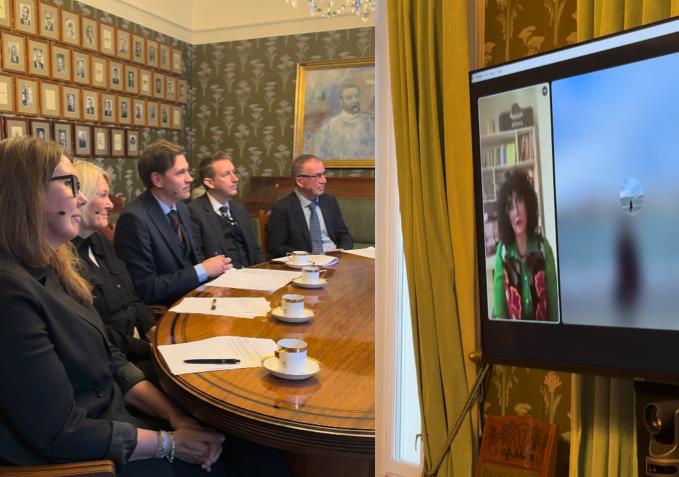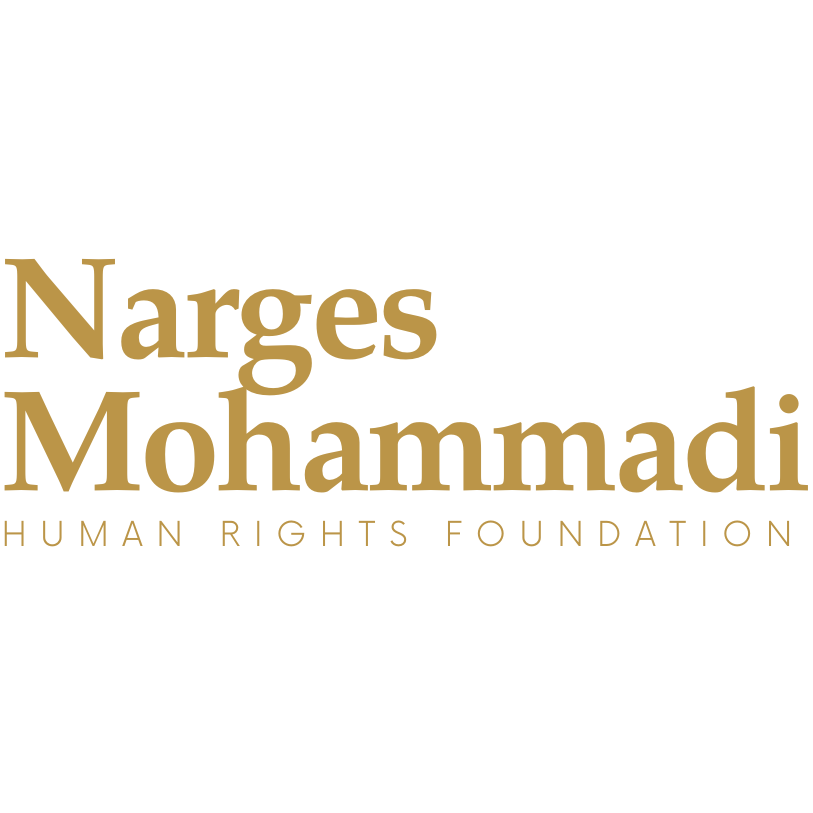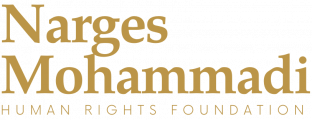
Narges Mohammadi’s Video Call with Norwegian Nobel Committee
Narges Foundation – Paris, 13 December 2024
Narges Mohammadi’s Video Call with Norwegian Nobel Committee.
On 8 December 2024, Narges Mohammadi met with the Norwegian Nobel Committee for the first time since the announcement of her Nobel Peace Prize on 6 October 2023.
Currently out of prison on a 21-day sentence suspension (not a medical furlough), Narges Mohammadi is required to serve the remaining days upon her return to prison.
The meeting, held in a private setting, included all members of the Norwegian Nobel Committee 2024: Jørgen Watne Frydnes (Chair), Asle Toje (Vice Chair), Anne Enger, Kristin Clemet, Gry Larsen, and Olav Njølstad (Secretary and Professor).
During this cordial and friendly discussion, the committee members spoke with Narges Mohammadi about her current situation, her health, and her anticipated return to prison.
As we send you this press release today, Narges Mohammadi has only 13 days remaining before she must return to prison. Despite this, her physical condition remains critical. She requires at least three months of medical treatment outside prison for numerous serious health issues, including heart problems, severe back pain, recovery from recent bone surgery and tumor removal, as well as a recent angiography. These conditions require consistent monitoring and care from trusted doctors and medical facilities—care that cannot be adequately provided within prison.
Here is their full conversation :
Jørgen Watne Frydnes (Chair): We’re deeply honored to have you with us today & we’re glad to see that you are finally at home, even though it is for a limited time. This is the Norwegian Nobel Committee. Your extraordinary bravery & unwavering commitment to human rights despite the unjust imprisonment you have faced in Iran inspires this committee & inspires us all & we are profoundly grateful for this opportunity to finally meet you and to express our admiration and support. Even though it’s digital, it is a great honor to finally meet you.
Narges Mohammadi: Thank you very much. I’m very happy. It’s a pleasure and honor to finally meet you today, even if only through a video call. Thank you.
Jørgen Watne Frydnes (Chair): We have had the honor of getting to know Kiana, Ali and Taghi. And I think words cannot express our admiration for your children and how pleasant it has been to meet them in December last year, but also throughout the year and the months that followed. We are really impressed how they have been able to be your voice to the outside world. Can I just ask a first question? Where do you find your energy and your strength coming from? We saw the pictures from when you came from prison and now you are at home. Where do you find the strength to continue your amazing work?
Narges Mohammadi: I believe that throughout all my time in prison and the years of struggle outside, what has kept me going is my dream and commitment to human rights and democracy. My determination has not diminished—in fact, it has only grown stronger, even behind bars.
Jørgen Watne Frydnes (Chair): What is your reflection and what do you want to say to both to the world, but also to the Norwegian Nobel Committee?
Narges Mohammadi: Hello to all the esteemed members of the Norwegian Nobel Committee,
It is a pleasure & honor to finally meet you today, even if only through a video call!
I had eagerly awaited the opportunity to attend the Nobel Peace Prize ceremony last year, to receive the award from Ms. Berit Reiss-Andersen & the Nobel Committee and to personally express my gratitude—a precious moment the religious tyranny denied me.
Allow me to share with you moments that will forever remain with me.
Hearing the slogan of our movement, “Woman, Life, Freedom,” echo on television from within Evin Prison was an unforgettable and deeply emotional moment.
In the women’s ward, we do not have access to telephones on Thursdays & Fridays. By sheer misfortune, this important announcement happened on October 6th, a day when we were cut off from the outside world. However, that day, one of my fellow prisoners managed to call her husband, who was also imprisoned in the men’s ward, as husband & wives who are both imprisoned under certain circumstances can, through them, we learned the incredible news: I had been awarded the Nobel Peace Prize.
In that instant, the women’s ward of Evin Prison erupted with chants of “Woman, Life, Freedom.” We gathered in the courtyard, singing, chanting and celebrating.
I want to sing one of the songs from that day:
The soil of this wheat lies in the streets,
The cluster of our anger thirsts for rain…
Our rights are profound,
No knees bent in sorrow—no time for sadness.
Our hearts remain close,
A new world is dawning; this is just the beginning.
The window to dreams stands open wide.
Together, or alone,
Bla bla chao chao chao!
We leap from sleep
Beneath the moonlit sky,
Awake until tomorrow.
In the end, the chains of tyranny
And the weight of widespread oppression
Will be shattered by our own hands.
It was truly something extraordinary.
On December 10th, the day of the ceremony in Oslo, when the award was formally presented to my children, Ali and Kiana, on my behalf, we held a grand celebration in the women’s ward.
The Nobel Peace Prize is much more than a personal honor; it is a powerful symbol of solidarity with the Iranian people in our ongoing struggle for human rights, women’s rights, and democracy. I also hope this award strengthens our resolve and amplifies our power to overcome religious tyranny.
The physical condition I endure today is the direct result of the regime’s policies in prisons—what I call the silent killing of political prisoners. Advocating for human rights and women’s rights is not a crime & I should be free to continue my work.
I have thoughts on my mind that I would like to share with you today.
I am deeply concerned about the worsening conditions of political prisoners in Iran. I worry constantly for those who face execution sentences, including two of my fellow inmates, Pakhshan Azizi & Varisha Moradi, who are facing death sentences as we speak…
I am deeply concerned about the escalating number of executions in Iran, the oppressive forced hijab laws, the growing population of political prisoners, and the systematic enforcement of gender apartheid against women.
I firmly believe that sustainable democracy and global peace are impossible without the full and equal inclusion of women. Democracy will not be realized without the recognition of women’s rights.
And after all, in 17 days, I am forced to return to my prison cell.
While I know I can accomplish much more outside prison walls, I will not allow imprisonment to silence me. Commitment to women’s rights, human rights, and freedom cannot be confined by any prison wall.
Today, I ask the Norwegian Nobel Committee to be our voice in the pursuit of democracy, women’s rights, and human rights.
With your permission, I will now switch to Persian to better convey my thoughts & emotions.
Jørgen Watne Frydnes (Chair): Before we open for comments and questions from the rest of the committee, I just want to show you one important thing. So, this is the committee room here at the Nobel Institute in Oslo. And on these walls, we have the portraits of all the Nobel Peace Prize laureates since 1901. And this is your portrait. Your portrait that for every meeting we have, fills this room with your enthusiasm, your courage and your hope. So, I hope that you can see the picture and also know that you are with us for every meeting we have.
My name is Kristin Clemet, I’m a member of the Nobel Committee.Thank you so much for your important message to us and to the world. I’d like to ask you a question about the situation for women in Iran. What can the world do to improve the situation and support women of Iran?
Narges Mohammadi: I want to specifically address the recent events regarding the decision made by Iran’s Islamic Parliament. This decision, which has been officially communicated to the government, is a direct attack on the women of this country and their rights.The new hijab law contains provisions that, in my opinion,are unquestionably a declaration of war against all women,affecting every aspect of their lives. From private homes to workplaces, streets, universities, and even in their cars, this law aims to control and restrict women everywhere.I will fight this with all my strength.I refuse to call this a “law”. I call it an “UNLAW” because a true law should uphold justice. What they have approved will specifically dismantle women’s rights and strip them of their access to justice.
So, I will continue to fight against this injustice with every ounce of power within me.
Asle Toje (Vice Chair): First of all, thank you.It’s so wonderful to see you in person. We’ve heard quite a lot of worrying news about your own health. Can you please tell us how are you doing and are all your medical needs being met at this time?
Narges Mohammadi: I am doing better now, attending physiotherapy sessions, and taking the time I need for medical rest. The truth is when I needed to be released from prison for medical care, the government denied my request for 22 days After a very serious surgery, only 48 hours later I was sent back to prison Inside prison from the necessary bandages for my surgery to the medication for bedsores, I received nothing. I was left without any medical care or assistance.They transferred me from a hospital bed to a prison bed, and it was an incredibly difficult time for me.
Gry Larsen: Dear Narges, my name is Gry Larsen I’m wondering, you do a lot of work for women, for democracy, but how do you think that the international community can help and be supportive in the best way?
Narges Mohammadi: I believe that the international support for the Iranian people’s movement, as they transition from religious tyranny to democracy, is what the people of Iran expect from the world. If we truly want democracy and peace globally, it is crucial that the world responds to the calls for peace and human rights in the Middle East and in Iran.
The world must pay attention. I am convinced that the international community, global media, and human rights defenders can serve as the voice of the Iranian people in their difficult struggle for democracy.
Olav Njølstad (Secretary): I am Olav, the secretary of the Norwegian Nobel Committee and the director of the Nobel Institute. You mentioned the increasing number of executions Iran. Why do you think the regime is stepping up the oppression right now and also increasing the number of executions?
Narges Mohammadi : Unfortunately, The Islamic Republic is taking its revenge on its own people for losing influence in the Middle East As much as the regime has lost its legitimacy among the people of Iran it seeks to retaliate against them for this loss of power The people of Iran have now become the direct target of the Islamic Republic as it tries to fabricate and conceal its power a power that, in reality, no longer exists This regime oppresses and executes its citizens to create a false show of authority In my view most people in Iran have grown weary of the Islamic Republic’s tyrannical rule and the regime is using oppression as a means to hold onto power an oppression that intensifies with every passing moment I believe the increasing number of executions we are witnessing in Iran is directly linked to the regime’s oppressive policies, desperate to maintain power and survive.
I expect the international community to take action against these executions in Iran the world must not remain silent. We must stop the executions now. As I speak to you today, two of my cellmates face execution sentences. I can’t help but reflect on how intolerable it is, that after 15 or 16 years, women political prisoners are again facing execution sentences I want to emphasize that the Islamic Republic’s anti-people policies are worsening, and executions have become an integral part of their strategy.
Jørgen Watne Frydnes (Chair): Your family has described a situation where they believe that the Islamic Republic regime is aiming for a “silent death” of you. What would your reaction be on that term?
Narges Mohammadi: It Isn’t the First Time—It’s Been Happening for a Long Time. I’ve come to understand That the Islamic Republic has long sought opportunities to silence any dissenting voices in the country Even if they aim to silence me, or activists like me what will they do about the people of Iran?
The people of Iran have risen, they’ve been protesting tirelessly. Just look at the streets of Iran, look at the women standing boldly, look at the diverse groups and demographics, Even the retired citizens, the oldest members of Iranian society, are out on the streets every day, demanding change, Even if they manage to silence me, it won’t change anything for the Islamic Republic. The reality is clear the people of Iran do not want this regime and the regime knows it That’s why they’re relentlessly trying to suppress every opposing voice especially those who can reach an audience who can speak to the world and the international community But even if they were to kill me, or remove me from their path, it wouldn’t matter.
The Islamic Republic has already failed in its attempt to silence the people of Iran
Jørgen Watne Frydnes (Chair): May I also ask a bit of a personal question? As far as we understand, you have been able to communicate and talk to your wonderful children Kiana and Ali, who just turned 18. How was that conversation?
Narges Mohammadi: The Day I Was Separated from Ali & Kiana, they were just 8 and a half years old, Now, as I step out of prison, they are 18. The first moment I held a phone and saw Ali and Kiana’s faces, I was in shock, I couldn’t believe how much they had grown, far more than I had imagined, it was nothing like what I had pictured all these years. As I walked out of prison, I didn’t foresee this overwhelming mix of emotions I was overjoyed by how much they had matured, how eloquently they spoke. Hearing their opinions, their thoughts, filled me with pride When Ali said, “Maman, I’m proud of you” it felt as if all the pain in my body vanished. For a moment, my leg didn’t hurt, & I felt light, free, & whole again. When Kiana said, “Maman, you should be in prison. How come you’re at home?” Her words, brought an ache wrapped in joy and love the truth is, I’ve lost so much time with them It’s a pain that weighs heavy on my heart…
8th Dec 2024
Narges Foundation


